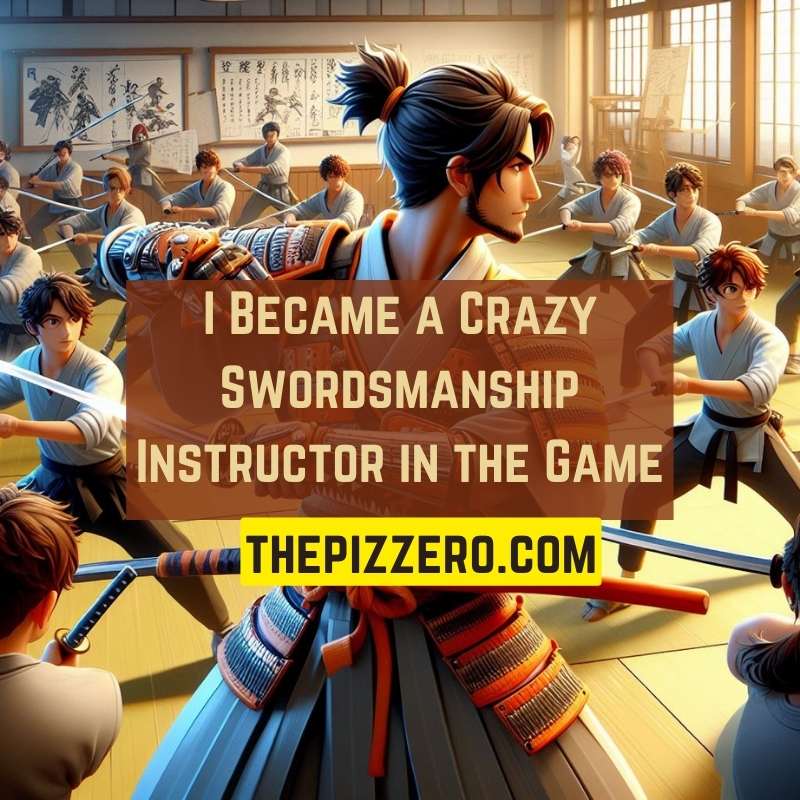I Became a Crazy Swordsmanship Instructor in the Game

i became a crazy swordsmanship instructor in the game
Forget the dusty manuals and choreographed duels. If you’re ready to ditch tradition and turn swordsmanship into an unpredictable dance of chaos, then step into the role of a “crazy” instructor. This game isn’t about who can parry the best – it’s about bending the rules, embracing the unorthodox, and training students to become forces of nature the battlefield has never seen. Get ready to question everything, laugh in the face of those who doubt you, and forge a path to victory that’s anything but ordinary.
Table Of Contents
What Does a “Crazy” Swordsmanship Instructor Even Mean?
Forget the stale manuals and rigid traditions. A “crazy” swordsmanship instructor throws those out the window, blazing their own path towards results. Here’s how that madness manifests:
- Unorthodox techniques that shake the foundations
You don’t teach parries; you teach turning an opponent’s blade into their downfall. You don’t focus on footwork alone; you introduce elements of dance and acrobatics. The usual rules of swordsmanship? You bend them, twist them, and forge something new. Think of these techniques:
* **The “Drunken Master” Stance:** Appearing unfocused, it actually maximizes unpredictable dodging and counters to exploit overconfident foes.
* **Blade Juggling:** A series of blindingly fast disarms and weapon changes meant to break an opponent’s composure.
* **Human Chessboard:** You treat the battlefield like a grid, using environmental objects and positioning as your ultimate weapon.
- Unpredictable teaching methods
Think less lectures, more live-action trials. One day your students might be blindfolded, relying on instinct. The next, they’re sparring against multiple practice dummies at once. You throw them curveballs, not simply to test them, but to force adaptation that becomes second nature.
A personality that’s larger than life
Are you a whirlwind of energy, inspiring with passionate speeches? A stoic eccentric, dropping cryptic wisdom? Maybe you’re the sarcastic mentor, breaking students down to build them stronger. You are a character, as memorable as the techniques you teach. This personality makes you “crazy”, but it’s also what makes your lessons unforgettable.
- Why go “Crazy” at All?
Because in this game world, tradition breeds complacency. Your unorthodox methods are the jolt the stagnant system needs. Your students, initially taken aback, will be the ones to break the mold and become forces to be reckoned with. And you, the crazy instructor? You’ll become the stuff of legends.
Is This Game Setting Me Up to Fail?
At first glance, it sure feels like it. Your appointment as a swordsmanship instructor isn’t a reward – it feels more like a punishment, or maybe a twisted joke. Here are the obstacles you’ll face:
- Facing off against privileged students
These aren’t just any kids. They’re the sons and daughters of nobles, used to having their way. They expect to be taught the standard moves, given an easy pass, and then inherit titles or positions of power. Your wacky lessons? A clash with their entitlement. Expect these challenges:
* Initial defiance and complaints from spoiled brats
* Attempts to undermine your authority or sabotage your work
* Potential for duels where your students hold back due to status
- Dealing with stuffy, traditionalist faculty
The other instructors aren’t your allies, they’re the opposition. They see your “crazy” methods as an affront to tradition, a stain on their prestigious academy. Prepare for:
* Constant scrutiny and evaluation, hoping you’ll slip up
* Snide remarks or outright attempts to discredit you to your students
* Political maneuvering to either get you fired or isolated
- Is there a hidden goal behind this wild journey?
The question gnaws at you. Maybe you weren’t placed in this position by chance. Perhaps someone with great influence and a hidden agenda is pulling the strings. Why would they do this? Here are some possibilities:
* **Reform:** A powerful figure wants to shake up the stagnant system, and your chaos is the perfect catalyst.
* **The Underdog Test:** They want to see if students trained in adversity, not privilege, will rise to become true forces to be reckoned with.
* **The Villain Forge:** Perhaps the true goal is darker, to force your students into desperation and mold them into ruthless assets for a shadowy purpose.
The ‘Crazy’ Instructor’s Edge
While these obstacles create a minefield, remember, you have one advantage the others don’t: you’re already seen as an outsider. This means you can play a longer game, cultivate allies where you’re least expected, and turn the tables on those who think you’re just another pawn in their game.
Perks of the Crazy Instructor Life
The challenges are immense, but so are the rewards that come with breaking the mold and defying the odds. Here’s what makes this unexpected journey so worthwhile:
- The respect you earn is genuine
The pampered students might start with contempt, but as they witness results, that begrudging respect is far sweeter than any flattery. They begin to see you’ve thrown them a lifeline. You’re not just teaching swordsmanship, you’re teaching them to adapt, to question, and to ultimately believe in their own potential. Here’s how that respect manifests:
* The once defiant eyes that now burn with determination
* The way those with privilege begin to shed their arrogance in favor of collaboration
* The quiet nods of approval when you walk past instead of whispers
- Watching your students push boundaries (and succeed)
As a crazy instructor, your wins aren’t just a well-executed technique, it’s watching your students become agents of change. They fight on their own terms, not those dictated by tradition. Their victories are unorthodox, messy, but undeniable. This means:
* The day a student disarms a high-ranking opponent using a move ridiculed as “foolish”
* Underdog teams emerging victorious in tournaments due to their creativity
* Your students becoming forces to be reckoned with, shaking up the power structures in place
Personal growth – the chaos makes you a better swordsman
You aren’t just dishing out madness; you’re living it. To teach unpredictability, you must embrace it yourself. This journey forces you to constantly reevaluate your own swordsmanship, question your limitations, and find new edges you never knew you had. It transforms you into:
* A more intuitive fighter: Your instincts sharpen as you analyze your students’ unpredictable choices.
* A truly adaptable combatant: Problem-solving on the fly to teach your way out of corners becomes second nature.
* Someone worthy of the respect you demand: You can’t be a hypocrite – you must walk the walk.
Being a “crazy” swordsmanship instructor isn’t a comfortable position. But the rewards are about more than status or riches. You play a part in shaping the future of this game world, and in the process, create a version of yourself you never thought possible.
But…Can You Actually Win?
Absolutely. But winning won’t look like a standard, heroic ending. It will be messier, require cunning, and redefine what victory means in the context of this game.
- Strategies for the underdog instructor
Think outside the sword fight. You won’t win by sheer force, but by being smarter than your opponents:
* **Knowledge is Power:** Delve into the academy’s history, its politics, and the true motivations of those in power. Blackmail material can be a surprisingly useful weapon.
* **Exploit the System:** Bend the rules without outright breaking them. Find loopholes in tournament structures or ways to turn tradition against the traditionalists.
* **Guerrilla Teaching:** When official lessons are scrutinized, hold secret sessions. Train in hidden locations or find ways to incorporate your crazy methods under the guise of acceptable drills.
- Building unusual alliances that bolster your cause
Your friends might be in unexpected places. Look to those overlooked to form a network:
* **The Support Staff:** Blacksmiths, stablehands, even kitchen workers – they see and hear things the elite don’t. Gain their trust, and you gain information.
* **Disgruntled Students:** Not just yours, but those stuck under traditional masters. They might be your spies or help you stage “accidents” to sabotage your rivals.
* **Outsiders:** Look beyond the academy. Merchants, travelers, maybe even roguish types…unusual connections can become resources when you need them most.
- Turning your reputation from “crazy” to “legendary”
Embrace the label, but reframe it. You’re not just unpredictable, you’re a force of nature. This involves:
- Calculated Spectacle: Engineer “outbursts” that serve a purpose – intimidate rivals or draw attention to hidden problems.
- The Long Game: Your lessons might initially fail, but let those failures be part of the plan. A shocking underdog victory becomes all the sweeter.
- Cultivate the Mystery: Drop hints of knowledge beyond swordsmanship, of a goal bigger than this petty academy. You’re always playing a game no one else understands.
Winning is Transformation
Victory as the crazy swordsmanship instructor won’t be a simple trophy. It’s your students disrupting the balance of power. It’s the stuffy faculty forced to question their ways. It’s you being the catalyst for a change this game world desperately needs, even if they don’t fully understand how you made it happen.
Is This the Game For Me?
Let’s be honest, playing a “crazy” swordsmanship instructor is not for everyone. But if the following makes your heart beat a little faster, then you might have found your perfect niche:
- If you love a challenge…absolutely
You won’t be handed success on a silver platter. This is a game designed to frustrate you, then make you laugh wickedly when you cleverly turn the tables. Think of these scenarios:
* Every early lesson plan feels like it’s backfiring disastrously.
* You have more enemies than allies, at least initially.
* It takes genuine effort to even figure out your win conditions.
- If you crave a unique power fantasy…this is it
It’s not about simply becoming the most skilled swordfighter. Your power lies in being an unpredictable force that reshapes the game’s landscape. It’s the thrill of:
* Inspiring those who’ve been written off to find their own strength.
* Defeating opponents who are technically superior, but rigid.
* Gaining a reputation that’s a mix of fear and awe, making your very name a weapon.
- If you don’t mind a little tongue-in-cheek humor…jump in!
This game takes itself seriously enough to be immersive, but not so seriously that your unorthodox antics feel out of place. Imagine:
* Delivering over-the-top motivational speeches that students roll their eyes at…until they start to work.
* Sparring with students using ridiculous props to teach a principle.
* Earning nicknames that are both insulting and strangely accurate.
The Right Kind of Player
This game world wants you to be resourceful, not just skilled. It wants you to be the catalyst that makes the predictable become unpredictable. If you have the patience to persevere through the initial chaos, and the audacity to become the eye of the storm, then step into the arena. This isn’t just another sword fighting game. This is about shaking things up and leaving your mark.
My Top 3 Insane Techniques That (Surprisingly) Worked
Buckle up, because these aren’t your grandfather’s fencing lessons. Here’s where the “crazy” earned its title:
Technique #1: The “Pinball Wizard”
Imagine: Your student strapped into a padded harness, transformed into a living pinball. The training ground is a chaotic obstacle course – swinging logs, popping dummies, and strategically placed barrels. You, the puppeteer of pandemonium, unleash a barrage of practice strikes, not to wound, but to send your student ricocheting around the course. Their mission: react with lightning speed, navigate the chaos, and stay on their feet.
Why it’s Crazy: To outside observers, it’s brutal and borderline ridiculous. Other instructors scoff, muttering about child endangerment (though the padding is top-notch, of course).
Why it Works: This isn’t just about reflexes. The Pinball Wizard builds spatial awareness like nothing else. Students learn to anticipate blows, exploit the environment for cover, and think two steps ahead. It’s combat chess played at breakneck speed. Expect to see students dodging under swinging logs, using barrels as springboards to launch surprise attacks, and developing a newfound respect for well-placed furniture during a fight.
Technique #2: “Shadow Puppet Combat”
Imagine: A darkened training hall, the only light source a single flickering candle. Students, clad in dark clothing, become living shadows. Sparring matches turn into a dance of silhouettes, a deadly ballet where attacks are anticipated based on the faintest shift in shadow or the whisper of fabric.
Why it’s Crazy: Most would call it reckless, even dangerous. The complaints about bruised shins and pulled muscles are inevitable (though a well-placed shadow can be a surprisingly effective defense).
Why it Works: Shadow Puppet Combat eliminates reliance on visual cues. Students are forced to hone their instincts, listen to the tells of their opponent’s breathing and movement. It’s a crash course in precognitive strikes and defensive counters based on pure gut feeling. While traditionalists scoff, there’s a certain poetry to defeating your opponent without ever truly seeing them coming.
Technique #3: “The Disappearing Act”
Imagine: Vanishing without a trace, leaving your bewildered students a cryptic note: “Find your own strength. I’ll be back when the moon is full.” Days turn into weeks, with no sign of you. Students are forced to rely on themselves, analyze your past lessons with no guidance, and essentially teach each other.
Why it’s Crazy: On the surface, it looks like you’ve abandoned your post entirely. Higher-ups are breathing down your neck, and rumors of your dismissal swirl through the academy.
Why it Works: Desperation breeds innovation. Students thrown into the deep end discover potential they never knew they had. They bond over the challenge, analyze your techniques with newfound focus, and develop their own variations. When you finally reappear, you’re not dictating their growth, but analyzing their unique solutions, encouraging them to become self-sufficient warriors.
Important Note: These techniques are inherently adaptable. They can be scaled to various difficulty levels depending on your students’ progress in the game world. The key is that they are surprising, force students outside their comfort zones, and deliver unconventional results that get them thinking and fighting in entirely new ways.
It’s Not Just About YOU
While your journey is unique, the most thrilling aspect might be the way you transform those around you. Let’s consider a few key figures:
- Your top student archetypes
- The Underdog: Overlooked, with raw talent but no confidence. Your methods unlock their ferocity and create a champion no one saw coming.
- The Rebel: Shares your disdain for tradition. Initially drawn to your defiance, but your focus on results molds them into a real leader.
- The Skeptic: Doubts every word you say, but driven by a hunger to prove you wrong. They end up your greatest success, even if they’d never admit it.
- How the story can unfold for THEM
Your students are not sidekicks; they’re protagonists in their own right. Consider these narratives:
* **The Rise of the Outcasts:** Your underdog students form an unstoppable squad, shaking up tournaments, and forcing respect where none was given.
* **The Change Agent:** Maybe your star pupil doesn’t rise through battle, but by reforming the system from within, their weapon being politics, not swords.
* **The Unexpected Hero:** A quiet student, overlooked by everyone, learns that true strength is found in your more outlandish teachings… and they’re the one to save the day.
- Supporting characters that might be more than they seem
This game world isn’t just opponents and students. Look deeper at those on the sidelines:
* **The Weary Master:** A traditionalist, initially your fiercest rival, but might they see a glimmer of their old passion reignited by your chaos?
* **The Mysterious Patron:** Who placed you here? A seemingly insignificant figure might hold the key to the larger purpose behind it all.
* **The Rival Academy:** Another school, the epitome of tradition. Could your success lead to a clash far greater than mere students?
The Instructor’s Legacy
Victory for the “crazy” instructor isn’t just about titles. It’s about proving that potential lies in unexpected places. It’s about lighting a fire that will spread long after your own role in this game’s world is done.
Final Word: Embrace the Madness
This isn’t some sanitized sword-fighting simulator. It’s about turning tradition on its head, finding victory in the absolute least expected ways, and unleashing your inner maverick. If any of this sounds like you, then welcome to the insanity:
- Forget predictability. In this game world, your greatest weapon is the element of surprise. Leave your opponents, even the players themselves, constantly guessing what you’ll throw at them next.
- Think like a revolutionary, not just a teacher. You’re here to question the status quo. Your success will leave shockwaves that change not just your students, but the very foundations this game world is built on.
- Love the laughter (and the hate). They’ll call you crazy, reckless, maybe worse. But when those ‘crazy’ tactics work, when your defiant students start shaking things up, that laughter becomes grudging respect… and a whole lot of fear from your enemies.
The Question Isn’t ‘Can You Win?’… It’s ‘How Spectacularly Will You Disrupt Everything?’
This game is for those who dare to be different, to rewrite the rules by completely disregarding them. If you see the thrill in turning an underdog story into an epic tale of defiance, and leaving opponents scrambling while you’re laughing…then step into this role.
Let the madness be your guide, and make them remember your name.






